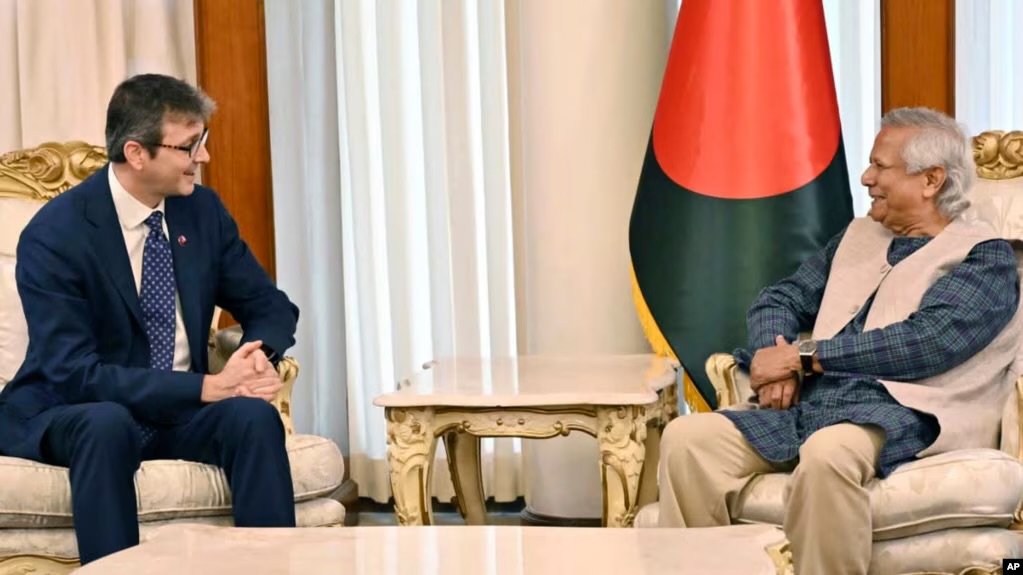A high-level U.S. delegation met with Muhammad Yunus, the head of Bangladesh interim government, on Sunday to discuss economic cooperation. Yunus, a Nobel laureate, took over leadership after former Prime Minister Sheikh Hasina fled amid a mass uprising last month. The meeting focused on economic reforms, rebuilding the country, and addressing key challenges.
Yunus Takes Charge Amid Crisis
Sheikh Hasina, who ruled Bangladesh for 15 years, left the country after being accused of corruption, human rights abuses, and using excessive force against protesters. Her departure left Bangladesh in turmoil, with Yunus stepping in as the interim leader.
During her time in power, Hasina maintained strong ties with India, China, and Russia. These countries heavily invested in Bangladesh’s infrastructure, trade, and economy. The U.S. also became the largest foreign investor during her rule.
However, under Yunus’ leadership, the focus has shifted toward economic recovery and reform. Yunus expressed a strong desire to work closely with the United States to bring back stability and progress.
U.S. Pledges Support
The U.S. team vowed to support Yunus’ government and was led by Brent Neiman. He is assistant secretary for international finance at the U.S. Department of the Treasury. Representatives from the Office of the U.S. Trade Representative and the U.S. Agency for International Development (USAID) were also part of the group.
During the meeting at the State Guest House Jamuna in Dhaka, Yunus outlined his administration’s priorities. These include rebuilding the economy, carrying out financial reforms, and fixing critical institutions such as the judiciary and police.
Yunus emphasized that his administration had already started making key changes to “reset, reform, and restart” the country’s economy. He also urged the U.S. to support Bangladesh in recovering stolen assets that left with former leaders.
U.S. Businesses In Bangladesh
American companies have a significant presence in Bangladesh. The U.S. delegation also took time to meet with members of the American Chamber of Commerce in Bangladesh (AmCham). The meeting, held on Saturday, focused on the challenges U.S. businesses face. Especially given the ongoing economic and political uncertainty in the country.
Syed Ershad Ahmed, president of AmCham, expressed concerns about profit repatriation issues due to a shortage of U.S. dollars in the country. He also mentioned the ongoing congestion at Bangladesh’s ports. This has led to supply chain problems.
While there have been improvements since the interim government took over, several bottlenecks still need to be addressed to ensure smoother operations for American companies.
Unrest in the Garment Industry
Bangladesh’s garment industry, one of the largest in the world, has been hit hard by recent unrest. Thousands of workers have walked out of factories. They are demanding better benefits and higher wages. The shutdown of factories has created tension between workers, factory owners, and the government.
To resolve the situation, discussions are ongoing between the government, factory owners, and labor leaders. This unrest has further complicated Bangladesh’s economic recovery. The garment sector is a vital part of the country’s economy, and prolonged strikes could worsen the economic situation.
U.S. Aid to Bangladesh
As part of their support, USAID signed an agreement to provide Bangladesh with $202.25 million in aid. The U.S. embassy highlighted how important economic reforms are to unlocking Bangladesh’s potential for growth. It stressed that the American private sector could play a key role in helping Bangladesh achieve sustainable development.
The United States has committed to supporting Bangladesh in its fight against climate change. Bangladesh is one of the most vulnerable countries to climate-induced disasters such as floods, cyclones, and rising sea levels. On its official Facebook page, the U.S. embassy said the U.S. aims to help Bangladesh mitigate climate risks and protect its people from the dangers of climate change.
The Road Ahead
Bangladesh faces a difficult road ahead as it grapples with political unrest, economic challenges, and labor strikes. Along with the support of the U.S. and other international partners, the interim government hopes to stabilise the country, enact reforms, and rebuild its economy.
Muhammad Yunus, known for his work in microfinance and poverty reduction, will need to navigate these challenges while ensuring that the needs of Bangladesh’s people are met. The U.S. delegation’s visit marks an important step in building stronger ties between the two nations as Bangladesh seeks a brighter future.

